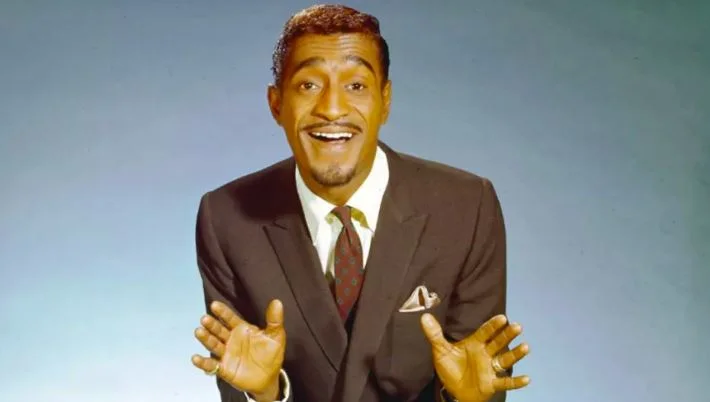
Sammy Davis Jr Ethnicity and Parents Origin
Sammy Davis Jr was a multifaceted entertainer whose remarkable talent and charisma made him a prominent figure in American culture during the mid-20th century. He was known for his exceptional abilities as a singer, dancer, actor, and comedian, becoming a member of the legendary Rat Pack alongside Frank Sinatra and Dean Martin. While his artistic achievements were groundbreaking, his ethnic background and familial origins provide a deeper understanding of his identity and the influences that shaped his career.
Sammy Davis Jr Cultural Background
| Category | Actors |
|---|---|
| Full Name | Sammy Davis Jr |
| Birthdate | December 8, 1925. |
| Birthplace | Harlem, New York City. |
| Ethnicity | Mixed of African American, Puerto Rican and Jewish descent. |
| Father Ethnicity | African American descent. |
| Mother Ethnicity | Puerto Rican descent. |
Sammy Davis Jr was a towering figure in American entertainment, celebrated for his incredible talents as a singer, dancer, actor, and comedian. However, his cultural background played a significant role in shaping his identity, artistry, and the impact he made on the entertainment industry. Born into a diverse family with a rich cultural heritage, Davis’s life and career reflected a blend of African American and Hispanic influences, contributing to his unique style and approach to performance.
Sammy Davis Jr Early Influences
Born on December 8, 1925, in Harlem, New York City, Sammy Davis Jr was the son of Sammy Davis Sr., an African American entertainer, and Elvera Sanchez, a woman of Puerto Rican descent. This multicultural upbringing exposed him to a variety of artistic influences from an early age. His father was a member of the vaudeville circuit, and Davis was introduced to the world of performance through his father’s work. This environment fostered his love for music and entertainment, allowing him to explore various genres, including jazz, pop, and Latin music.
Davis’s mother, Elvera, brought her Puerto Rican heritage into the family, emphasizing the importance of cultural pride and the arts. Growing up in a household where music and dance were celebrated, Davis learned to embrace the rhythms and sounds of his Hispanic roots, which later became evident in his performances. The fusion of these cultural influences helped shape his distinctive style, marked by his dynamic dance moves, powerful vocals, and a flair for showmanship.
Sammy Davis Jr Cultural Challenges and Triumphs
Despite his immense talent, Davis faced numerous challenges due to the racial climate of the time. As an African American entertainer in the mid-20th century, he encountered significant prejudice and discrimination. His ethnicity and cultural background often placed him in a difficult position within the entertainment industry, which was largely dominated by white performers. Nevertheless, Davis’s determination and talent allowed him to break through these barriers, paving the way for future generations of artists.
In the face of adversity, Davis became an advocate for racial equality and a symbol of resilience. He was one of the first Black performers to achieve widespread acclaim, performing in venues that were traditionally exclusive to white entertainers. His success not only showcased his individual talent but also challenged the status quo, proving that diverse cultural backgrounds could coexist and thrive in the entertainment industry.
Sammy Davis Jr Integration of Cultural Elements
Davis’s performances often reflected his cultural background, incorporating elements from both African American and Hispanic traditions. His music and dance style drew inspiration from jazz, rhythm and blues, and Latin rhythms, creating a unique fusion that appealed to a broad audience. He was known for his energetic performances, combining intricate dance moves with powerful vocals, which captured the essence of his cultural influences.
Davis also showcased his appreciation for different cultures through his collaborations with various artists, crossing genre boundaries and expanding his artistic horizons. He often incorporated Latin-inspired music into his repertoire, further highlighting the significance of his Puerto Rican heritage. This blending of cultures not only enriched his performances but also demonstrated the beauty of diversity in art.
Sammy Davis Jr Legacy and Impact
Sammy Davis Jr cultural background played a pivotal role in shaping his identity and career. He became a trailblazer for African American entertainers, using his platform to advocate for racial equality and social justice. His ability to draw from his diverse heritage allowed him to connect with audiences on a profound level, transcending racial and cultural divides.
Through his work, Davis left an indelible mark on American culture, influencing generations of artists across various genres. His legacy continues to inspire performers today, reminding them of the importance of embracing their cultural backgrounds while breaking down barriers in the pursuit of artistic expression. Sammy Davis Jr remains a symbol of resilience, talent, and the celebration of cultural diversity in the arts.
Sammy Davis Jr Ethnicity
Sammy Davis Jr was born on December 8, 1925, in Harlem, New York City, to a mixed-race heritage that included African American, Hispanic, and Jewish roots. His father, Sammy Davis Sr., was a prominent African American entertainer and a member of a famous Black vaudeville troupe, while his mother, Elvera Sanchez, was of Puerto Rican descent, with a rich cultural background that encompassed Spanish and African influences. This diverse ethnic heritage profoundly influenced Davis’s artistic expression and musical style, allowing him to draw from a wide range of cultural traditions. Growing up in Harlem, a vibrant hub for African American culture, he was immersed in the sounds of jazz, blues, and Latin music, which enriched his creative palette and laid the foundation for his future success.
As a Black performer in an era marked by racial segregation and discrimination, Davis faced numerous challenges throughout his career. Despite these obstacles, he broke barriers in the entertainment industry, becoming one of the first African American artists to achieve mainstream success. His unique ability to blend various musical styles, including jazz, pop, and Latin music, showcased the richness of his multicultural background, resonating with audiences across racial and ethnic divides. Davis’s performances often highlighted his heritage, emphasizing his identity and the power of diversity in music, ultimately paving the way for future generations of artists to embrace their backgrounds and share their stories.
Sammy Davis Jr Siblings and Family
Sammy Davis Jr was not only a remarkable entertainer but also a family man deeply connected to his roots. Understanding his siblings offers insight into his early life and the dynamics that shaped him as a person and an artist. Davis had a complex family structure that included several siblings, and these relationships played a significant role in his upbringing.
Sammy Davis Jr Siblings Overview
Sammy Davis Jr was born to Sammy Davis Sr. and Elvera Sanchez, and he had several siblings. However, details about his siblings are somewhat limited. He had one half-brother, Sammy Davis Jr and one half-sister, Shirley Davis. Although he wasn’t extensively open about his family life, he shared a close bond with his siblings.
Sammy Davis Jr Brother
Sammy Davis Jr was born from Davis’s father’s side. As his half-brother, he had a connection to the Davis family’s entertainment legacy. While not much is documented about him, growing up in the shadow of a famous brother like Sammy Davis Jr would have been a unique experience, offering a glimpse into the world of show business.
Sammy Davis Jr Sister Shirley Davis
Shirley Davis, also from Davis’s father’s side, is another of Sammy’s half-siblings. Like her brother, she was raised in an environment that valued the arts, but her life remained largely private. The influence of their parents, particularly their father’s career as an entertainer, likely impacted their understanding of the performing arts.
Impact on Sammy Davis Jr
While his siblings maintained a relatively low public profile, the connections within the Davis family significantly impacted Sammy Davis Jr. Family life in Harlem during the 1930s and 1940s shaped itself around the challenges of the era, including racial segregation and economic hardships. Growing up in this environment, Sammy and his siblings learned the importance of resilience and determination.
Having siblings also provided Sammy with a support system as he navigated the trials and tribulations of his early career. The bonds he formed with his family likely instilled a sense of responsibility and commitment, both to his craft and his loved ones. As he rose to fame, Davis often expressed the importance of family in his life, which was evident in his performances and personal relationships.
Sammy Davis Jr Parents’ Origin
Sammy Davis Jr father, Sammy Davis Sr., was born in 1900 in New York City. He grew up in a family that valued the performing arts, instilling in him a passion for music and dance from an early age. His career as a dancer and entertainer began in vaudeville, where he performed alongside notable acts, honing his skills in front of diverse audiences. Sammy Sr. faced the challenges of being a Black performer in a segregated America, providing his son with firsthand insight into the struggles and discrimination that entertainers encountered. This experience not only shaped Davis Jr understanding of the industry but also instilled in him a profound resilience and determination to succeed. His father’s journey through the entertainment landscape highlighted the importance of perseverance and adaptability, qualities that would become central to Davis Jr own career.
Davis’s mother, Elvera Sanchez, came from a Puerto Rican family rich in cultural traditions and artistic expression. Her background infused Davis Jr upbringing with the vibrant rhythms and sounds of Latin music, enriching his musical palette. Growing up in Harlem, an epicenter of African American culture and creativity, Davis was surrounded by a plethora of artistic influences that spanned genres and cultures. This multicultural environment allowed him to appreciate the nuances of his heritage, and his parents’ commitment to preserving their cultural identities enabled him to celebrate his own multifaceted background. Their diverse legacies not only shaped his artistic identity but also inspired him to become a trailblazer, bridging the gap between various musical styles and cultural experiences throughout his illustrious career.
Sammy Davis Jr A Stellar Professional Career
Sammy Davis Jr was a legendary figure in the world of entertainment, celebrated for his incredible versatility as a singer, dancer, actor, and comedian. His career spanned several decades, during which he broke barriers in the entertainment industry, becoming an icon and a trailblazer for future generations of performers. This article delves into the key milestones and achievements that defined his remarkable professional journey.
Sammy Davis Jr Early Beginnings
Sammy Davis Jr was born into a show business family, which significantly influenced his career trajectory. He began performing at a young age, often accompanying his father, Sammy Davis Sr., on stage. By the time he was just three years old, he was already performing in vaudeville shows. His early exposure to various forms of entertainment allowed him to hone his skills, particularly in dancing and singing, as he frequently showcased his talent alongside his father and the Will Mastin Trio, a group that included his father and their friend Will Mastin.
Sammy Davis Jr Rise to Fame
Davis’s big break came during the 1950s when he gained national attention as a member of the Rat Pack, a group of entertainers that included Frank Sinatra, Dean Martin, and Joey Bishop. The Rat Pack became synonymous with Las Vegas nightlife, performing in high-profile shows that blended music, comedy, and camaraderie. Davis’s charisma and exceptional talent stood out, and he quickly became a fan favorite.
His solo career flourished during this period, marked by hit records such as “The Candy Man,” “Mr. Bojangles,” and “I’ve Gotta Be Me.” His ability to fuse various musical styles, including jazz, pop, and soul, captivated audiences and showcased his unique artistry. In 1964, he won a Grammy Award for Best Pop Vocal Performance for his rendition of “The Candy Man,” further solidifying his status as a leading entertainer.
Sammy Davis Jr Acting Career
Davis was not only a musical sensation but also a talented actor. He appeared in numerous films and television shows throughout his career, showcasing his ability to excel in various genres. Some notable films include “Ocean’s 11” (1960), where he played the role of “Josh,” and its sequels, which became iconic classics. He also starred in “Sweet Charity” (1969) and “A Man Called Adam” (1966), where his performances garnered critical acclaim.
In addition to film, Davis was a frequent guest on television shows, including “The Ed Sullivan Show” and “The Dean Martin Show.” His television appearances often featured his signature style, which included song and dance, captivating audiences with his magnetic presence. He also made history by becoming one of the first Black performers to host his own television special, “The Sammy Davis Jr Show,” which aired in 1966.
Sammy Davis Jr Later Career and Legacy
Davis’s career continued to thrive into the 1970s and 1980s, despite facing challenges related to racial discrimination and personal struggles. He remained a popular figure in Las Vegas, performing regularly and attracting diverse audiences. His talent transcended cultural boundaries, allowing him to connect with people from all walks of life.
Throughout his career, Davis received numerous accolades for his contributions to entertainment, including a star on the Hollywood Walk of Fame and several Grammy Awards. His legacy as a performer who broke racial barriers and paved the way for future generations is undeniable. Sammy Davis Jr is remembered not only for his extraordinary talent but also for his resilience and determination in an industry that often sought to marginalize artists of color.
Conclusion
Sammy Davis Jr legacy as an entertainer is intrinsically linked to his ethnic background and the origins of his parents. His mixed-race heritage, which combined African American and Puerto Rican influences, provided him with a unique perspective that informed his artistry and allowed him to transcend racial barriers. In a time when segregation and discrimination were rampant in the United States, Davis emerged as a beloved figure in American entertainment, breaking new ground for artists of color. He embraced his diverse background, incorporating elements of various musical styles and cultural expressions into his performances, which resonated with audiences from all walks of life.
By drawing from the rich tapestry of his African American and Puerto Rican ancestry, Davis not only forged a successful career but also became a trailblazer who opened doors for future generations of performers. His story exemplifies the power of diversity in the arts, highlighting how cultural influences can enrich artistic expression. Moreover, Davis’s journey serves as a reminder of the importance of embracing one’s heritage while navigating the complexities of identity. His impact continues to inspire artists today, reinforcing the idea that true talent knows no racial or ethnic boundaries. People will always remember Sammy Davis Jr. not just for his remarkable achievements but also for promoting inclusivity and celebrating diversity in the entertainment industry.



